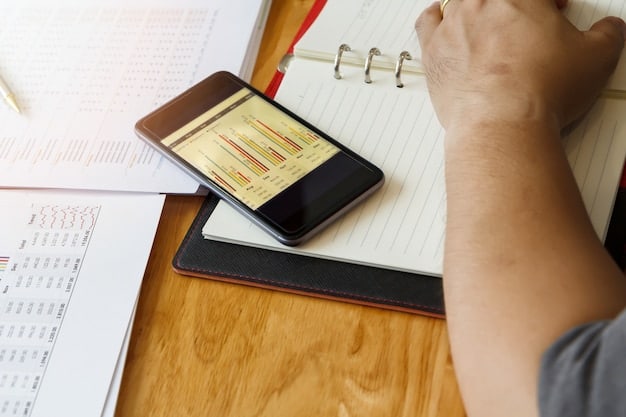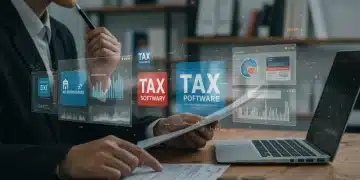Personal Budgeting for Freelancers: A 2025 Guide to Managing Income Swings

Personal budgeting for freelancers in 2025 requires adapting to income fluctuations by setting financial goals, tracking expenses, creating a detailed budget, and utilizing tools to achieve financial stability.
Freelancing offers freedom and flexibility, but it also comes with the challenge of inconsistent income. Mastering personal budgeting for freelancers: managing income fluctuations in 2025 is crucial for achieving financial stability and peace of mind.
Why Personal Budgeting is Essential for Freelancers
For freelancers, a stable income isn’t always guaranteed, making personal budgeting for freelancers: managing income fluctuations in 2025 more critical than for those with traditional employment. Without a solid budget, managing expenses and saving for the future can be a serious struggle.
Effective budgeting can help freelancers navigate financial uncertainties and build a secure future.
Understanding Income Fluctuations
Freelance income can vary significantly from month to month, depending on project availability, client payments, and market demand. Recognizing these fluctuations is the first step in creating a budget that works.
The Importance of Financial Goals
Setting clear financial goals gives freelancers something to strive for and helps prioritize spending. Whether it’s saving for a down payment on a home or planning for retirement, goals provide motivation and direction.
- Identify your short-term and long-term financial goals.
- Prioritize your goals based on importance and urgency.
- Define specific, measurable, achievable, relevant, and time-bound (SMART) goals.
By embracing personal budgeting for freelancers: managing income fluctuations in 2025, freelancers can gain control over their finances and build a more secure future.
Setting Realistic Financial Goals in 2025
Financial goals provide freelancers with a roadmap for managing personal finances, especially with the ever-changing economic landscape. Having clear, achievable goals turns budgeting into a more meaningful and actionable process.
Freelancers should consider short-term, mid-term, and long-term goals to create a comprehensive financial plan.

Defining Short-Term Goals
Short-term goals typically focus on immediate needs and wants. These can include building an emergency fund or paying off a credit card debt. Setting realistic short-term goals makes you feel more in control of your financial situation.
Defining Mid-Term Goals
Mid-term goals usually have a timeline of one to five years. Freelancers might save for a major purchase, like a car or professional development courses, to improve their skills and marketability.
- Calculate the cost of each goal.
- Set a timeline for achieving each goal.
- Develop a detailed savings plan to reach your targets.
To be truly effective in personal budgeting for freelancers: managing income fluctuations in 2025, it’s important to review your goals and make adjustments as needed. Remember that your financial journey is dynamic, and your approach must evolve with it.
Tracking Income and Expenses Effectively
Tracking income and expenses is the foundation of personal budgeting for freelancers: managing income fluctuations in 2025. Without a clear record of where your money is coming from and going, it’s impossible to create an accurate budget.
Freelancers must adopt a consistent approach to monitoring their financial flows.
Whether you prefer spreadsheets, budgeting apps, or a combination of methods, the key is consistency. Set aside time each week to record your transactions and review your progress. This will help you stay on track and make informed decisions about your finances.
- Use budgeting apps for automatic tracking.
- Set up categories that mirror your expenses.
- Categorize your expenses to easily identify trends.
By consistently tracking both income and expenses, freelancers will be better equipped to manage their finances and achieve their goals. Embracing personal budgeting for freelancers: managing income fluctuations in 2025 will lead to a more secure future.
Creating a Flexible Budget for Variable Income
Creating a budget that accommodates variable income is crucial for freelancers looking to achieve financial stability. A flexible budget allows you to adjust your spending based on your income each month. This adaptability ensures you’re not overspending during the lean months and allows you to capitalize on higher-earning months.
To create a flexible budget, start by calculating your average monthly income. Look at your earnings over the past six to twelve months and divide by the number of months to get an average figure.

Estimating Your Average Income
Estimating an average income is a vital step in creating a sustainable budget for freelancers. By understanding your income patterns over time, you can plan your expenses accordingly, ensuring you have enough money to cover your needs, even in slower months.
Prioritizing Essential Expenses
Distinguishing between needs and wants will greatly impact the effectiveness of your budget. Needs are essential expenses that you must cover each month, like rent, utilities, and food.
Remember, the key to successful personal budgeting for freelancers: managing income fluctuations in 2025 is adaptability. Your budget should be a living document that you review and adjust regularly based on your changing circumstances and financial goals.
Utilizing Budgeting Tools and Apps
In today’s digital age, numerous budgeting tools and apps are available to help freelancers manage their finances more efficiently. These tools can automate many of the tasks, making it easier to track income, monitor expenses, and stay on budget.
Choosing the right budgeting app depends on your individual needs and preferences. Some apps offer basic tracking features, while others provide advanced tools.
Popular Budgeting Apps for Freelancers
Several budgeting apps stand out for their features tailored for freelancers. These apps are designed to automate the nuances of managing income fluctuations and provide clear financial insights.
- Explore the array of budgeting apps tailored to freelancer need
- Select tools that allows for integration with banking accounts and payment platforms
- Set financial goals and create customized saving plans within the platform.
The right tools streamline financial management, making personal budgeting for freelancers: managing income fluctuations in 2025 more manageable and effective.
Building an Emergency Fund for Financial Security
An emergency fund is a crucial component of personal budgeting, providing a safety net to cover unexpected expenses without derailing your financial plan. Freelancers, in particular, should consider building a robust emergency fund to protect themselves against unpredictable income fluctuations and unforeseen costs.
The ideal emergency fund size varies depending on your individual circumstances, but a general rule of thumb is to save three to six months’ worth of living expenses.
Building and consistently replenishing an emergency fund can significantly reduce financial stress. Prioritizing personal budgeting for freelancers: managing income fluctuations in 2025 can turn unexpected financial challenges into manageable setbacks.
| Key Point | Brief Description |
|---|---|
| 🎯 Setting Goals | Define clear, realistic financial targets for better money management. |
| 📊 Tracking Expenses | Monitor income and expenses to identify spending habits and trends. |
| 🧰 Budgeting Tools | Use apps and tools for automated expense tracking and budgeting help. |
| 💰 Emergency Fund | Build a safety net to cover unexpected costs and income dips. |
Frequently Asked Questions (FAQ)
▼
Review earnings from the last 6-12 months. Calculate the average monthly income to forecast future earning and budget accordingly. This helps manage income variation.
▼
Apps like Mint, YNAB (You Need A Budget), and Personal Capital offer tools for tracking expenses, creating budgets, and monitoring financial goals. They offer varied features to streamline financial.
▼
Aim to save 3-6 months’ worth of living expenses. Saving ensures you can cover costs during drops in income. This provides financial stability.
▼
Cut non-essential spending, negotiate payment terms, explore alternative revenue streams. Adjusting the budget manages financial gaps. Keep focusing.
▼
Tracking expenditure reveals spending habits, identifies cost-cutting, assesses budgeting’s accuracy. It enables more financial control and informed decisions for growth.
Conclusion
For freelancers in 2025, mastering personal budgeting involves a smart combination of setting realistic goals, managing fluctuating income, and using suitable tools. By following these guidelines, freelancers can achieve financial security and maintain success in uncertain times.





